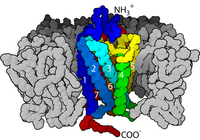
Photo from wikipedia
Simple Summary Understanding the role of the plasma membrane in the responses of cancer cells to chemotherapy is important because the cell membrane is directly involved in drug transport and… Click to show full abstract
Simple Summary Understanding the role of the plasma membrane in the responses of cancer cells to chemotherapy is important because the cell membrane is directly involved in drug transport and the regulation of numerous biological processes. However, the role of the plasma membrane in cell resistance to platinum drugs like oxaliplatin is not fully understood. In this study we identified the changes to plasma membrane viscosity and lipid composition induced by oxaliplatin in responsive, cultured cancer cells and in mouse tumors. It was also found that the acquisition of chemoresistance is accompanied by modification of membrane lipids in ways that preserve the viscous properties unchanged upon further treatment. Therefore, new therapeutic approaches could be developed to reverse chemoresistance based on membrane lipid modifications and the de-stabilisation of membrane viscosity. Abstract Maintenance of the biophysical properties of membranes is essential for cell survival upon external perturbations. However, the links between a fluid membrane state and the drug resistance of cancer cells remain elusive. Here, we investigated the role of membrane viscosity and lipid composition in the responses of cancer cells to oxaliplatin and the development of chemoresistance. Plasma membrane viscosity was monitored in live colorectal cancer cells and tumor xenografts using two-photon excited fluorescence lifetime imaging microscopy (FLIM) using the fluorescent molecular rotor BODIPY 2. The lipid profile was analyzed using time-of-flight secondary ion mass spectrometry (ToF-SIMS). It was found that the plasma membrane viscosity increased upon oxaliplatin treatment, both in vitro and in vivo, and that this correlated with lower phosphatidylcholine and higher cholesterol content. The emergence of resistance to oxaliplatin was accompanied by homeostatic adaptation of the membrane lipidome, and the recovery of lower viscosity. These results suggest that maintaining a constant plasma membrane viscosity via remodeling of the lipid profile is crucial for drug resistance in cancer.
Journal Title: Cancers
Year Published: 2021
Link to full text (if available)
Share on Social Media: Sign Up to like & get
recommendations!